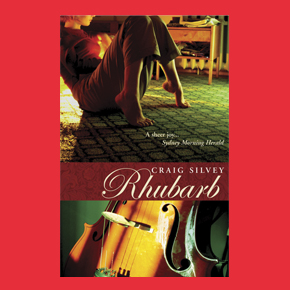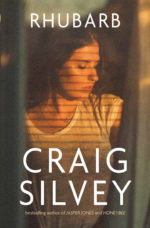Read this and be smarter: learn how to master the art of writing and turn your dream into a career with award-winning novelist Craig Silvey

Craig Silvey’s debut novel, Rhubarb, is a masterclass in writing from an author who was named in the Sydney Morning Herald Best Young Australian Novelists list in 2005 and again in 2010 for his novel Jasper Jones.
If you’re considering making writing your career, be sure to grab a ticket to the Business of Being a Writer event at Perth Festival Literature and Ideas Weekend on Saturday 22 February. Craig will be one of many expert panellists there to talk about how to kickstart your writing.
In the meantime, revel in the mastery of Rhubarb in this extract from the novel.
Sliding in stealthily off the coast is a fat slab of cumulus, its belly warmed by the sun’s passing. Deep, dense and dark it is; the result of a northern cyclone. Ribs of waves usher it forward with frothy lips. It creeps low and bulges with volition. Gorging on stars and moonlight. It belches cool air.
People snuggle into thick sheets and eiderdown, wary of the looming doona above, thankful for the heat ease. They wait.
Eleanor Rigby is baking muffins in the dark. Banana and cinnamon muffins. She sifts flour and whittles away night hours. Her breath is bitter with thirst and stale coffee.
Through open windows, Eleanor feels the cool humid change and its promise of rain and is not thankful. She hopes it passes quickly. She has never liked winter. Rain has always just further hemmed her confines, kept her inside.
Eleanor slips outside to strip her washed sheets from the line. A sudden chill shudders her shoulders. She is spat on intermittently from above as she gathers the bundle in her arms. And buried hidden in the scent of rain and fresh linen is a winter memory: of her mother, fondly folding linty sheets with memories of her own.
On wet weekends she often waxed sentimental about Inverness, the shire in Scotland where she had grown up. While it made her two daughters churlish and restless, winter always made her wistful. She spoke with a renascent sweetness in her smothered accent. Rain always reminded her of Home, she said, which was a Guest House her family ran in Drumnadrochit. She told Eleanor that people from all over the world stayed there, and told her tales of their own Homes. They had all come to see the Loch Ness Monster. She told Eleanor that Loch Ness was the most beautiful place she had ever seen. And Eleanor believed her, because her mother had seen the world. She showed her sepia photographs of the family lined by the loch, and surprised her daughter by their resemblance at the same age. She told her that the only Monsters at Loch Ness were her brothers who chased her up and down the headland with handfuls of mud.
Once, when it rained on her birthday, she gave Eleanor a ribbon of their original clan tartan, which she tied carefully into her hair. She promised her that they would go to Inverness together one day, when it was cold here and warm there, to see Loch Ness.
Eleanor said that it sounded like Happy Ness was just round the bend.
She imagined it. A Place. Where merry redbearded Scots in merry tartan kilts jigged and skipped in bright highlands, singing merry songs while munching buttery shortbread. In Happy Ness, they tossed pillarlike cabers and watched them cartwheel merrily downhill into a sparkly lake. Kersploosh. And according to Eleanor, if Happy Ness was a Place, then there must be other Places too. Like Cold Ness. And Wet Ness. Quiet Ness. And nearby Wilder Ness. And it sounded like you didn’t have to go far to find Kind Ness. But you had to travel a long way to get from Near Ness to Far Ness. Big Ness loomed over Small Ness. There was a road that led straight to Mad Ness (where pale nude people with darting heads spoke only to themselves). And the boisterous people of Guin Ness (who liked Bitter Ness), sometimes passed Drunken Ness on their way there.
You had to climb the grassy slopes of Steep Ness to get to High Ness (where Godly Ness, of course, was next to Cleanly Ness) and shielding your eyes from the sun you could see Vast Ness. In the shadow of that mountain lurked Sad Ness, Empty Ness and Lonely Ness.
As the sun went down, the lush Green Ness turned into a dusky Dim Ness.
And it didn’t matter where you were, reasoned Eleanor, because at night-time, everyone was in Dark Ness.
And you could walk through all these places in Dark Ness, when the sky was ink and the air was shadow. If you were lucky, you might bump into somebody nice. But you could walk for miles and miles and miles and still be in the same place, never to be seen.
And some people can’t get out.
Bed made, Eleanor moves back into the kitchen to beat her mix without reflection. The television is off, so Estelle is sleeping. Warren warms his rump by the preheating oven.
She grits her teeth against a prickling pain in the base of her belly. With her foot she prods her dog out of the way. He licks spilt sugar from linoleum while she slides in the tray and slaps the door shut.
There is no breeze. She slowly packs things away. Warren circles, circles, circles and slumps back in front of the oven. The house is suddenly silent.
But in Dark Ness there is music playing. Only she can hear. A murmur, sad and saccharine. The sound of lullabies and comfort singing softly insistent in her head.
And then it spills, like a weeping confession. Straightdown, in heavy crackling sheets. It batters nodding leaves and drumrolls every roof. Slick streams of it follow contours, collecting Summer’s dust and shit and residual heat. It washes cars and evicts earthworms. Hippies in colourful Punjabi suits laugh and dance in it with their thin arms raised and waving. They are stung by occasional bullets of hail. Thunder rumbles. Birds bathe with ruffled wings and dip their beaks into shallow pools. Surfers prep their boards. And Santa is woken on a back lawn. He giggles nervously, shivering, squinting, and wonders if he is drowning, wonders why he can’t move.
People peel back their curtains just to watch the hissing swathe. One of them is Ewan, shirtless, sleep eluding him again. His room is still sultry with preserved heat. He observes a stolid, dignified frog squatting on his verandah, regarding the summer rain with suspicion. He is interrupted though, again, by the irritating source of his sleeplessness. Above him, more plangent than the roof-pounding rain, is the scrabbling and orgiastic squealing of those two relentlessly fucking possums. He glares at the ceiling. They have woken him at intervals throughout the night, and their current depraved foray moves him to a murderous, irrational anger.
From the kitchen he drags three stacked chairs and positions them beneath the manhole in his room. They groan and creak as he climbs them unsteadily. He lifts the manhole cover like a waiter carrying a tray. The ceiling is high, but he is just tall enough to peer into the roof cavity. The storm is deafening. Ewan slews a torch like a beacon and flinches as he spotlights two possums in reachable proximity; caught in their sordid act, frozen mid thrust. Joined unmistakably at the nether regions. One crouched, one upright. Ewan stares at the possums. The possums stare lazily at the light. With moist pink snouts and rigid bushy tails. They continue to stare as Ewan confronts his quandary. He is now unsure of what to do with them. He finds something unnerving about their haughty indifference.
Shut the fuck up! he yells at them finally, but he can barely hear his own voice.
And just as the two possums turn their heads to resume, a languid wolfspider wanders inquiringly on to the face of the torch, casting a sudden shadow large enough for Ewan to drop it in shock, lose his balance and topple forward, falling safely on to his bed. The manhole cover claps back into place. He is followed by a shower of dust. The spider totters out and down the hall (incidentally, to be eaten by the dignified amphibian).
Ewan lies with a pillow over his head.
It’s three forty-five when the rain eases and thins to drizzle. And in a child’s room, it’s three forty-five when a vigil slips again. Twice in as many days. But this time, it’s not exhaustion; she’s disarmed, suddenly, by the ceaseless sound between her ears. A voice captured on an offshore breeze. Even louder now. Her subconscious finds a beat in the flicker of a stuck clock. Her eyelids, though, are mercifully still. And in the cool air, she sighs and gropes, pulling a sheet over herself. A cover, if only thin. It clings to her skin.
And under the same clearing cloudlayer, for the first time, Eleanor and Ewan both sleep on past dawn. Both their sheets stay dry. And both are woken late by resurgent heat.
Rhubarb by Craig Silvey is available from all good bookstores and on the Fremantle Press website.
The Business of Being a Writer
Date: Saturday 22 February 2020
Location: The Undercroft, University of Western Australia, 35 Stirling Hwy, Crawley, WA
Cost: $29.99 + booking fees
Bookings via Perth Festival website



